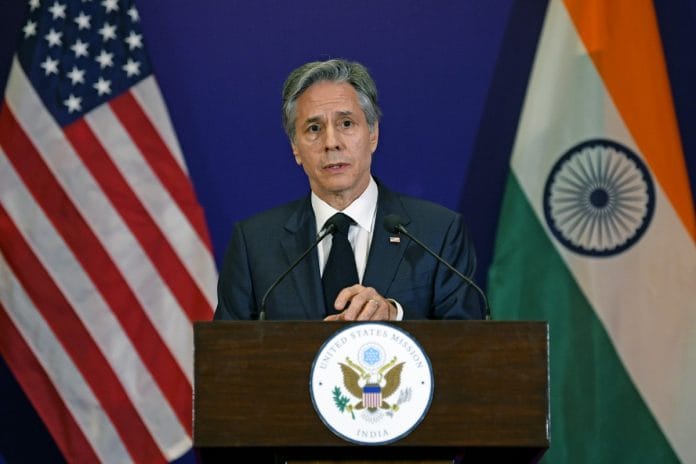New Delhi: US Secretary of State Antony Blinken, though agreeing with Prime Minister Narendra Modi’s assessment that “multilateralism is in crisis” around the world, added the caveat that there are “workarounds”.
In a media briefing Thursday night, Blinken said, “Prime Minister Modi is right that there are real challenges to the multilateral system…But I think we’ve demonstrated, including here today in Delhi, that we can find workarounds.”
While addressing the G20 Foreign Ministers’ Meeting earlier in the day, Modi remarked that multilateralism is in crisis today and that global governance has failed in fostering international cooperation and preventing wars.
Though the meeting did not result in a joint communique due to a lack of consensus among member states, India in its chair summary noted that Russia and China did not agree to sections that referenced the war in Ukraine.
Lack of consensus had led to a similar situation with the G20 Finance Ministers’ Meeting held in Bengaluru last week concluding without a joint communique.
Blinken, however, defended multilateral systems in his interaction with reporters by citing the passage of a UN General Assembly resolution that called for an immediate withdrawal of Russian forces from Ukraine — a vote India abstained from. The resolution was passed by 141 countries who voted in favour, while seven — Russia, Belarus, North Korea, Eritrea, Mali, Nicaragua and Syria – voted against and 32 abstained.
“What we’ve seen in the multilateral system is three-quarters of it coming together in the UN General Assembly to condemn Russia’s war of aggression against Ukraine and insist on a just, endurable peace,” argued the US Secretary of State Thursday.
He added, “Even as we’re focused on making sure that Russia can’t succeed in its aggression against Ukraine, we’re equally focused on engaging and solving problems that affect people around the world. We’re doing that through the G20 and the G7 and numerous other organisations.”
Blinken also cited India’s chair summary and outcome document following the G20 Foreign Ministers’ meeting as an example of a “workaround” when there are countries that act as an “outlier” — a veiled reference to Russia.
World leaders and heads of government will meet in Delhi for the G20 Summit in September this year where it is expected that action will be taken on commitments made in the ongoing G20 working group meetings.
Also Read: West vs Russia: Why ‘strengthening multilateralism’ is key agenda at G20 foreign ministers’ meet
‘China will face consequences’
Blinken, while speaking to reporters Thursday, also warned that if China supplies military aid to Russia or circumvents sanctions imposed by the West on Moscow, it would result in “serious” consequences, including sanctions.
“Were China to engage in material, lethal support for Russia’s aggression or to engage in the systematic evasion of sanctions to help Russia, that would be a serious problem…there would be consequences,” said Blinken.
He added, “I’m not going to detail what they would be, but of course, we have sanctions authorities of various kinds that would certainly be one of the things that we and others would look at.”
Without naming countries, the top US diplomat said certain officials who attended the G20 meeting in Delhi aired their concerns directly with the Chinese delegation about the possibility of China sending military aid to Russia.
Blinken’s remarks came amid reports that Washington is in talks with close allies about the possibility of imposing new sanctions on China if it provides military support to Russia for its war in Ukraine.
Asked about concerns over human rights issues in India, including the rights of religious minorities, Blinken said that he raised this issue with his counterpart, External Affairs Minister S. Jaishankar. “We regularly engage with our Indian counterparts to encourage the Indian government to uphold its own commitments to protect human rights,” he said.
Blinken added, “In most conversations that I have with my counterpart, Foreign Minister Jaishankar, this is an issue that we discussed, again, as we did today.”
(Edited by Amrtansh Arora)
Also Read: In Raisina Dialogue, Meloni says Italy ‘deeply European’, shares ‘peninsular culture’ with India






